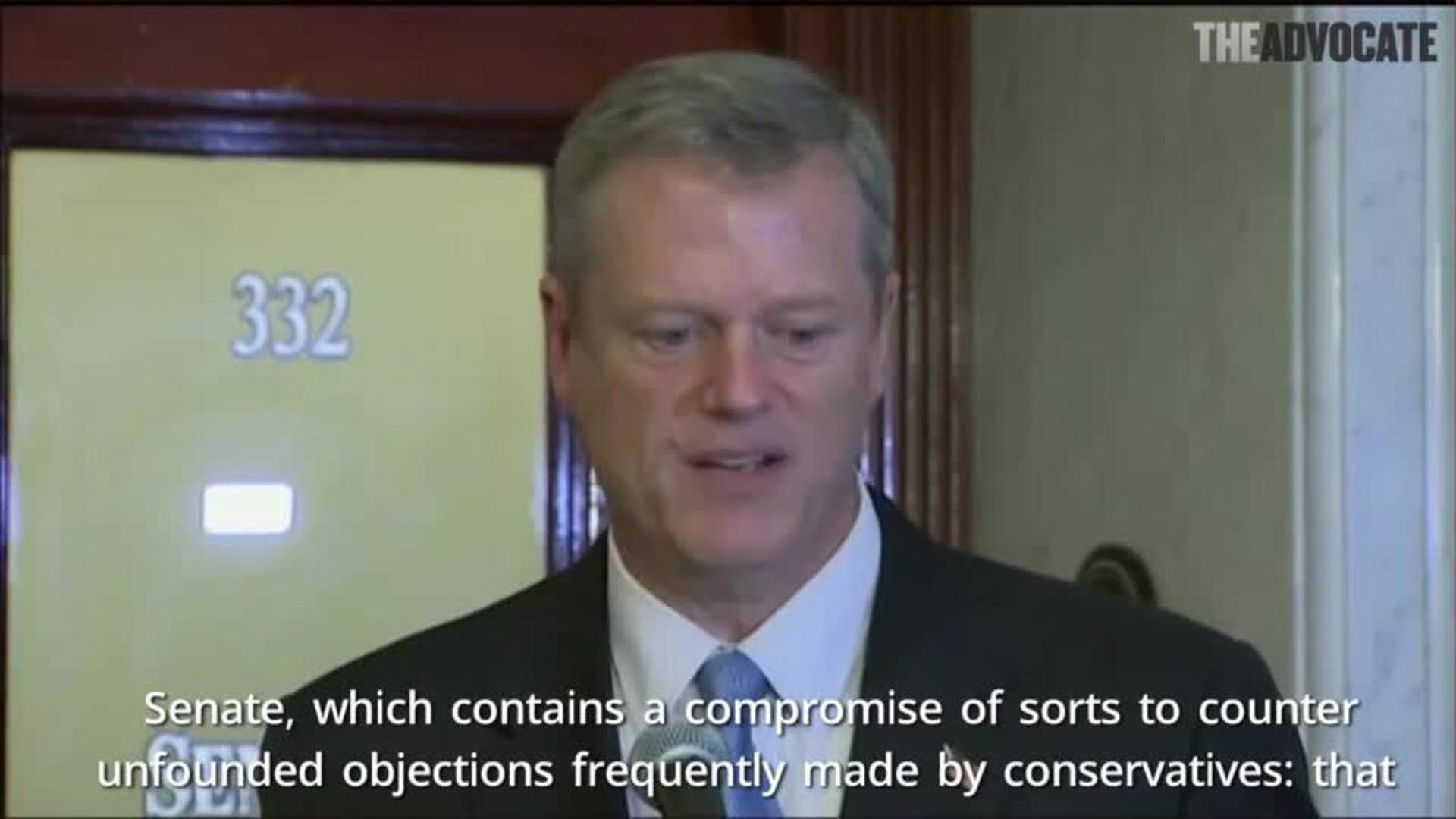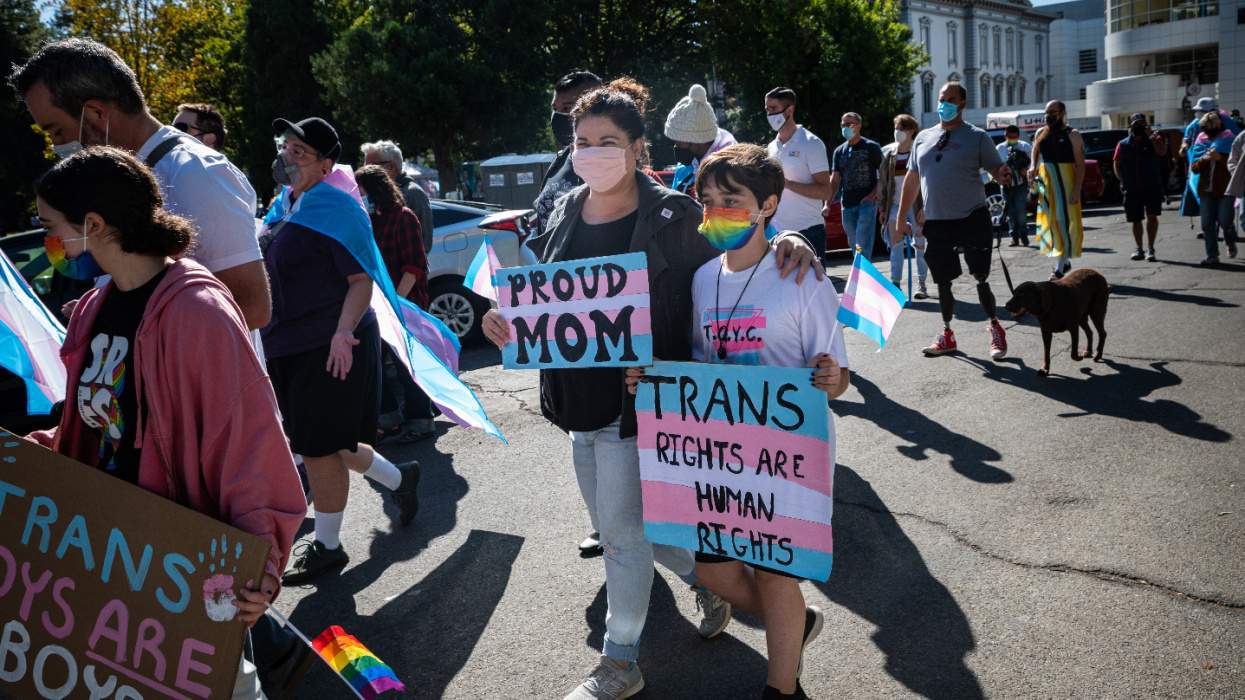Massachusetts Gov. Charlie Baker today signed landmark legislation allowing transgender people to use bathrooms and locker rooms in accordance with their gender identity and banning discrimination in public accommodations based on gender identity.
The House and Senate worked out differences between each chamber's versions of the legislation this week, with both approving a final version Thursday, and sent it to Baker for his signature. Over the past several months, Baker, a moderate Republican, had been cagey about whether he would sign such a bill, but he eventually indicated he would approve it.
The Senate version, Senate Bill 735, passed in May, contains a compromise of sorts to counter the objections frequently made by conservatives -- that laws assuring trans people's access to appropriate facilities could be be used fraudulently by men to enter to women's restrooms and locker rooms, and that the concept of gender identity is too vague to be enshrined in law. The legislation directs the Massachusetts Commission on Discrimination to develop policies and recommendations on when and how a person's gender identity would be established. It also directs the state attorney general to develop regulations for prosecuting individuals who "assert gender identity for an improper purpose."
The House legislation, House Bill 4343, which passed in June, did not contain this provision, which LGBT advocates said casts transgender people as predators and is unnecessary, because predatory or harassing conduct in restrooms is already a crime. Baker had said he would sign the Senate version, and this week the House OK'd the Senate language with minor alterations.
The legislation provides, among other things: "Any public accommodation, including, without limitation, any entity that offers the provision of goods, services, or access to the public, that lawfully segregates or separates access to such public accommodation or other entity based on a person's sex shall grant all persons admission to and the full enjoyment of such public accommodation or other entity consistent with the person's gender identity."
The new law marks a major victory in the fight against discrimination and criminalization of trans people in public bathroom and locker rooms this year. It passed despite vigorous opposition from conservative groups such as the Massachusetts Family Institute and Baker's own initial reluctance to support such a measure. LGBT rights groups, such as Freedom Massachusetts, built on the state's 2011 law protecting trans people from employment discrimination by keying the bill to discrimination protection for trans people in all public accommodations, such as shopping malls, restaurants, and parks.
Massachusetts LGBT groups praised the law's enactment. "By passing legislation that will ensure that transgender men and women are protected against unwarranted discrimination in public, Massachusetts continues to make strides on LGBTQ issues," said a statement issued today by Sylvain Bruni, president of Boston Pride.
Praise also came from Jennifer Levi, transgender rights project director at Boston-based legal group GLBTQ Advocates and Defenders. "So many people have worked hard and acted courageously to bring us to this moment," Levi said in a prepared statement. "We owe a debt of gratitude to the legislators who have stood up for equality, and to the transgender people and their families who have told their stories."
The effort by Massachusetts lawmakers stands in stark contrast to the more than a dozen states proposing bills to force trans people to use the restroom associated with the gender they were assigned at birth. The Massachusetts bills had wide bipartisan support and passed by significant margins in their respective chambers.
The push to prevent trans people from using bathrooms that accord with their gender identity has been extremely unpopular with businesses. When North Carolina passed its restrictive bathroom bill, PayPal and Deutsche Bank canceled expansions there. Hundreds of business in Texas are pressuring state legislators there to abandon their efforts to enact a similar law. A Tennessee lawmaker withdrew an anti-trans bathroom bill that drew objections from business leaders concerned about its economic impact, although she claimed this was not the reason.
The bills are also unpopular with voters. A CNN/ORN poll released last month showed 57 percent of people opposing such bills, with just 38 percent supporting them. Even among Republicans, support for these efforts were split evenly at 48 percent supporting and opposing the measures.
The fight to protect trans people in public accommodations is absolutely critical to the safety and survival of trans people. A study published earlier this year in the Journal of Homosexuality found a significant correlation between being denied access to public facilities and suicidality among trans people. In the aftermath of the passage of North Carolina's House Bill 2, calls to Trans Lifeline -- a crisis hotline for transgender people -- doubled. Perhaps most concerning is the fact that the bulk of these bathroom bills target already-vulnerable transgender youth and their access to gender-appropriate facilities in schools. A 2015 study indicated that trans youth face far higher levels of depression, anxiety, self-harm, and suicide attempts than their cisgender peers, and other studies have found that unsupportive social environments increase mental health and suicide risks for trans people.
President Obama and the Department of Education officials took steps to protect trans youth with their guidance supporting trans students' access to appropriate bathrooms in schools. That guidance, however, is now the subject of two lawsuits, indicating that resistance to such access remains.
--Additional reporting by Trudy Ring
















Charlie Kirk DID say stoning gay people was the 'perfect law' — and these other heinous quotes
These are some of his worst comments about LGBTQ+ people made by Charlie Kirk.